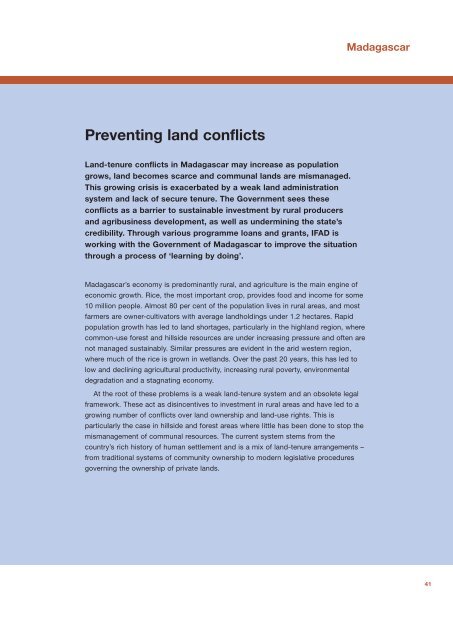Community-based natural resource management - International ...
Community-based natural resource management - International ...
Community-based natural resource management - International ...
Create successful ePaper yourself
Turn your PDF publications into a flip-book with our unique Google optimized e-Paper software.
Preventing land conflicts<br />
Land-tenure conflicts in Madagascar may increase as population<br />
grows, land becomes scarce and communal lands are mismanaged.<br />
This growing crisis is exacerbated by a weak land administration<br />
system and lack of secure tenure. The Government sees these<br />
conflicts as a barrier to sustainable investment by rural producers<br />
and agribusiness development, as well as undermining the state’s<br />
credibility. Through various programme loans and grants, IFAD is<br />
working with the Government of Madagascar to improve the situation<br />
through a process of ‘learning by doing’.<br />
Madagascar’s economy is predominantly rural, and agriculture is the main engine of<br />
economic growth. Rice, the most important crop, provides food and income for some<br />
10 million people. Almost 80 per cent of the population lives in rural areas, and most<br />
farmers are owner-cultivators with average landholdings under 1.2 hectares. Rapid<br />
population growth has led to land shortages, particularly in the highland region, where<br />
common-use forest and hillside <strong>resource</strong>s are under increasing pressure and often are<br />
not managed sustainably. Similar pressures are evident in the arid western region,<br />
where much of the rice is grown in wetlands. Over the past 20 years, this has led to<br />
low and declining agricultural productivity, increasing rural poverty, environmental<br />
degradation and a stagnating economy.<br />
At the root of these problems is a weak land-tenure system and an obsolete legal<br />
framework. These act as disincentives to investment in rural areas and have led to a<br />
growing number of conflicts over land ownership and land-use rights. This is<br />
particularly the case in hillside and forest areas where little has been done to stop the<br />
mis<strong>management</strong> of communal <strong>resource</strong>s. The current system stems from the<br />
country’s rich history of human settlement and is a mix of land-tenure arrangements –<br />
from traditional systems of community ownership to modern legislative procedures<br />
governing the ownership of private lands.<br />
Madagascar<br />
41

















